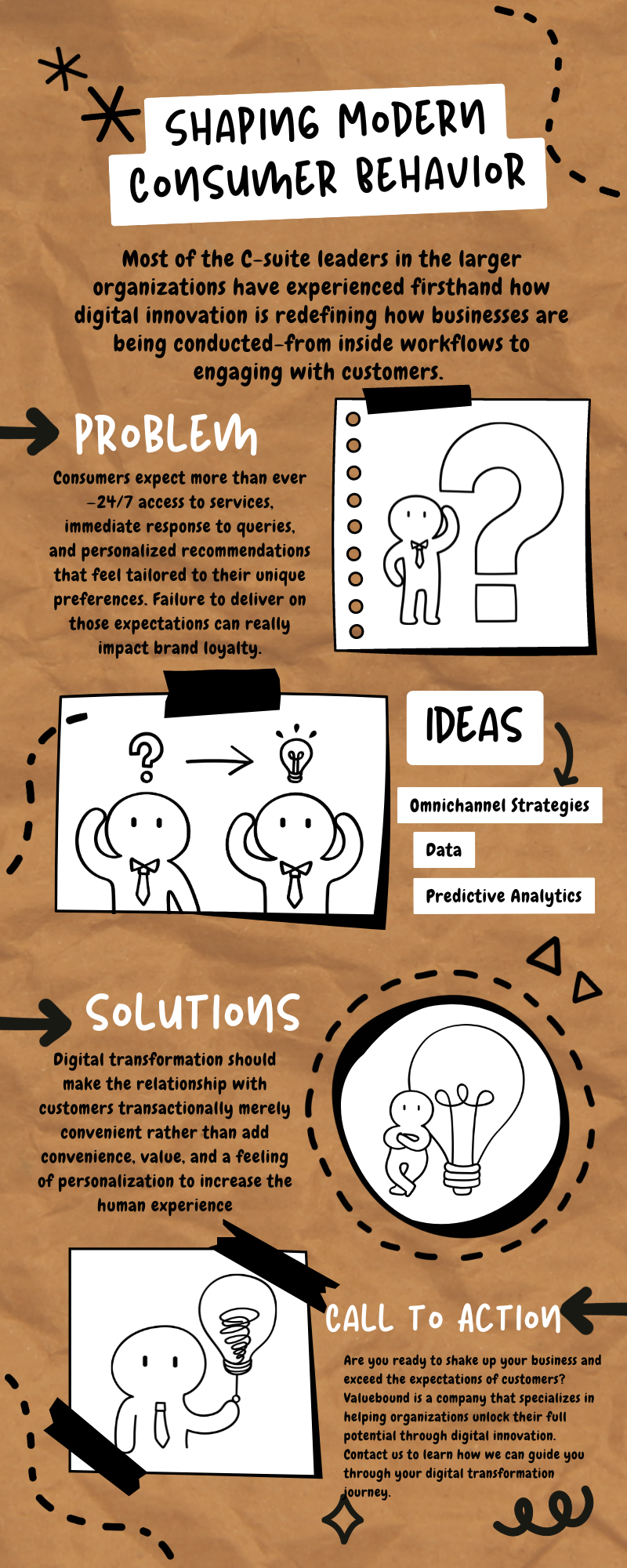Digital Transformation is the need of the hour for modern businesses- not just because it's the "trend," but also because there has recently been a paradigm shift in the way businesses engage with customers. At the heart of digital innovation is technology- more so- the latest tech trends that are suddenly changing the course of interaction between brands and consumers. Digital technology innovations have made brands more interactive for consumers, but how?
Valuebound believes that digital transformation involves not only what is titled by the buzzword – implementing new technologies – but really an evolution that would take into account the new expectations of a modern-day consumer and dispose of these inherent challenges within this transformation journey.
Most of the C-suite leaders in big organizations understand that digital innovation in the AI era is a whole new ball game, and it is more tech trends like these that are redefining how businesses operate and conduct from within their organizations. Let's not call it an upgrade; rather a whole new paradigm shift towards digital innovation. Everything is about consumer behavior and creating customer journeys that offer convenience, personalization, and immediacy of interaction with the help of a solid digital transformation strategy.

Digital Transformation and its Impact
Digital transformation refers to embedding digital technology into all aspects of a business. This means that all aspects of an organization experience significant alterations from top to bottom. Digital transformation is all about embedding latest technologies like machine learning, data analytics, and artificial intelligence- everything that can be a key differentiator between you and your competitor.
Customers now expect a seamless digital experience at every touch point. Because of instant access to information and recommendations and direct interaction with a brand, consumers have never had more power than they do today. As businesses invest in digital transformation, the time has come to focus on understanding and anticipating these evolving customer needs.
Fundamentally, digital transformation has reshaped consumer behavior, making a steep turn towards a more connected, personalized, and on-demand experience. Smartphone penetration and the proliferation of social media and e-commerce has made customers expect quicker and more seamless interaction across multiple touchpoints. Customers demand interactions across multiple platforms, real-time responses, and tailored offerings that meet their individual preferences.
The convenience brought about by digital technologies has empowered consumers to make more informed decisions. They can compare products, read reviews, and access services instantly, raising their expectations for transparency and speed. Businesses that fail to adapt risk losing customer loyalty, as consumers are now more likely to switch to competitors who offer a superior digital experience.
Moreover, digital transformation has given rise to new business models, such as subscription services and sharing economies, further altering traditional consumer behavior. The influence of AI and data analytics has enabled companies to predict consumer needs, enhancing the customer journey through personalized recommendations and automated support.
Digital transformation has made consumers more empowered, demanding, and connected, pushing businesses to innovate continuously to stay relevant in an increasingly competitive marketplace. The future of consumer behavior will likely be shaped by how well businesses can integrate digital strategies to meet evolving expectations. But what are the pain points of businesses today?
Challenges of Digital Transformation
Digital transformation holds immense potential, but it also presents businesses with ongoing challenges. One of the biggest is keeping up with shifting consumer expectations. Today’s consumers expect round-the-clock access to services, quick responses to their inquiries, and personalized recommendations that feel tailor-made. Falling short in any of these areas can significantly affect customer loyalty.
A major hurdle for many businesses, especially long-established ones, is the integration of legacy systems with modern digital technologies. For many, outdated infrastructure makes it difficult to innovate digitally. This not only slows down the transformation process but also hampers the ability to offer smooth, seamless experiences to customers.
Additionally, concerns around data protection and security remain a significant barrier to full digital transformation. As consumers become more aware of their digital footprints, businesses must find ways to balance personalization with data privacy.
Age of Omnichannel Experiences
Another key focus in digital transformation is omnichannel customer experiences. Today’s consumers engage with brands across multiple touchpoints—mobile apps, websites, social media, and in-store interactions. To stay competitive, businesses must deliver a consistent and seamless experience across all these channels.
At Valuebound, we’ve helped many organizations enhance their customer engagement through omnichannel strategies. By using AI-powered chatbots, personalized email campaigns, and data-driven insights, we ensure that customers receive a unified, tailored experience no matter where or how they interact with the brand. This approach strengthens customer loyalty and delivers more meaningful connections across all platforms.
Leveling Data to Consumer-centric Strategies
The data is the core of today's modern business strategy, enabling businesses to lead in the ever-changing pattern of consumer behavior shaped by digital transformation. Using these data intelligently, businesses can unlock precious insights into customers' preferences, buying patterns, and emerging trends. This data-driven approach allows a business to provide experiences at scale, and more importantly, connect strongly with consumers.
Predictive analytics is one of the methods that can predict the needs of its customers and even provide anticipatory solutions. Businesses can fit their marketing efforts with the unique needs and wants of specific consumer based on past behaviors and interactions. Such a level of personalization boosts customer satisfaction while driving long-term loyalty.
Innovating for Human Solutions in Digital Transformation
Lack of digital skills and talent across industries has become a major roadblock for organizations willing to take their digital leap. New digital systems, emerging technologies, and innovations require workforce that can adapt to a fast-changing digital ecosystem. Even with Gen-Z adapting the pace of technologies, organizations still struggle to find or train talent that can meet these demands. This hampers or creates a gap between phases of digital transformation strategy. It also creates delays in adopting and implementing the latest digital tools and strategies.
At Valuebound, we provide strategic consulting on identifying these talent gaps, helping organizations reskill their workforce and create an agile team ready for digital transformation. We help businesses ensure they have the right talent to navigate the ever-evolving digital landscape.
We offer strategic consulting to help organizations identify these skill gaps and support them in reskilling their workforce. We work with companies to build agile teams equipped to handle the fast-paced demands of digital transformation, ensuring they have the talent needed to thrive in a rapidly changing landscape.
Accepting Digital Transformation for a Customer-Centric Future
The rapid pace of digital transformation demands business agility, adaptability, and a strong focus on the customer. At Valuebound, we are committed to helping organizations navigate the complexities of their digital transformation strategy—from leveraging cutting-edge technologies to understanding and responding to evolving consumer behavior. Our goal is to enable businesses to deliver joyful, personalized, and innovative digital experiences that meet rising customer expectations.
This is just the beginning of the journey toward a fully transformed digital world, offering endless opportunities for companies that embrace the change. Through digital innovation, businesses can seize these opportunities, overcoming digital transformation challenges and unlocking sustainable value for both customers and themselves.
Are you ready to transform your business and exceed customer expectations? Valuebound specializes in helping organizations achieve their full potential through digital innovation. Contact us to learn how we can guide you through your digital transformation journey and help you stay ahead in an increasingly competitive market.
FAQs:
1. What is digital transformation?
Digital transformation is the rapid, strategic integration of digital technology across all areas of a business, enabling it to use digital technologies to create fundamentally new--barring rare exceptions--product and service designs.
2. How does digital innovation influence consumer behavior?
Digital innovation enables consumers to have more information and tailored experiences, bringing businesses onto their own terms, which makes convenience and speed significantly riskier.
3. What are some of the most common risks in digital transformation?
These include integration of the new technologies with the existing legacy systems, data privacy and security, and the expectation from consumers for seamless journeys across channels, thereby making these experiences more personalized.
4. How can companies use data to improve customers' experience?
Companies can use predictive analytics and data insights to better understand customer needs and provide customized solutions to improve their experience and loyalty.
5. What is the role of human factors in digital transformation?
Although technology is an important building block, the human element must form that connection with the customer. Businesses are quickly realizing the importance of an improved customer experience through personalization, convenience, and value.





